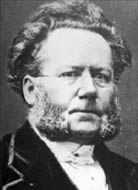The
Lady From The Sea
by Henrik Ibsen |
| |
Click on the title above to read the ebook,
click the eBooks Cube logo at the top left to return to the
main page,
or search by title and/or author using the search form. |
| |
| About The Author: |
 |
|
 |
 |
Plays
 An
Enemy of the People An
Enemy of the People
 The
Lady From The Sea The
Lady From The Sea |
|
 |
Henrik (Johan)
Ibsen (1828-1906)
Major Norwegian playwright of the late 19th century who
introduced to the European stage a new order of moral
analysis that was placed against a severely realistic
middle-class background and developed with economy of
action, penetrating dialogue, and rigorous thought.
Ibsen was born at Skien, a small lumbering town of southern
Norway. His father was a respected general merchant in
the community until 1836, when he suffered the permanent
disgrace of going bankrupt. As a result, he sank into
a querulous penury, which his wife's withdrawn and sombre
religiosity did nothing to mitigate. There was no redeeming
the family misfortunes; as soon as he could, aged just
15, Henrik moved to Grimstad, a hamlet of some 800 persons
70 miles (110 km) down the coast. There he supported himself
meagerly as an apothecary's apprentice while studying
nights for admission to the university. And during this
period he used his few leisure moments to write a play.
Along the way, Ibsen experienced multiple shifts in dramatic
form and philosophy as he gradually came to terms with
the intellectual, emotional, and spiritual forces that
were at war within his complex psyche. But throughout,
his plays are characterized by their rebellious spirit
and their unforgiving scrutiny of Ibsen's own faults and
virtues.
Ibsen's early plays are wild and epic, utilizing an open
form and concentrating on mystical, romantic, poetic visions
of the rebel figure in search of an ultimate truth which
is always just out of reach. In Brand, revolts against
God, howling at the heavens, like Prometheus, only to
be punished with a huge avalanche which buries him alive.
In Peer Gynt, a young man rebels against society by choosing
to live a life of waste, only to find himself, ultimately,
living in a world of lost opportunities. Emperor and Galilean
traces the life of the fourth-century Roman Emperor Julian,
a disenchanted youth who seeks out a variety of religious
experiences in a search for beauty and truth, but eventually,
after failing to find contentment, devotes himself to
overthrowing the stage religion of Christianity.
With The League of Youth, Ibsen begins his "modern"
phase--an eleven year period during which he would consciously
suppress his Romanticism along with his poetry and mysticism
and focus instead on the problems of modern society. These
plays are characterized by their "realism,"
a self-imposed discipline which the playwright hoped would
help audiences to more easily digest his radical views.
This period produced several masterpieces, including Ghosts
and Hedda Gabbler, but the aging playwright continued
to suffer harsh attacks from his critics.
In his final period, Ibsen returned to the more mystical
subjects of his youth, tempered now by the Classical restraint
of his middle period. Embittered by the lack of public
enthusiasm for some of his plays, the dramatist painted
a moving portrait in The Master Builder of an aging architect
who, having given up his dreams of building great monuments
and churches with towers reaching up to the heavens, instead
devotes his life to building regular houses for people
to live in. When the architect finally realizes that society
doesn't even appreciate his sacrifice, he returns once
again to the more mystical structures of his youth. Although
Henrik Ibsen was never fully appreciated during his lifetime,
he has since come to be recognized as one of the great
dramatists of all time and the "Father of Modern
Drama." |
|

|
 |
|





